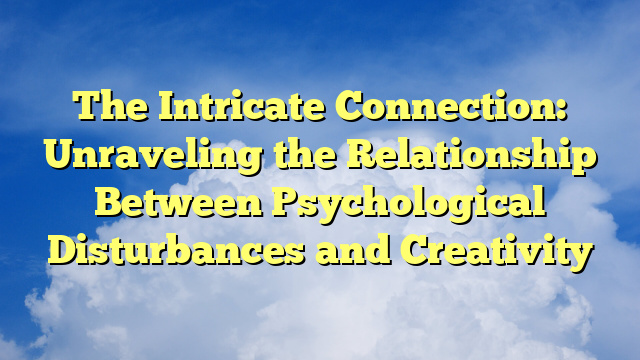The Intricate Connection: Unraveling the Relationship Between Psychological Disturbances and Creativity
The Intricate Connection: Unraveling the Relationship Between Psychological Disturbances and Creativity
Introduction
Throughout history, there has been a long-standing belief that there is a strong connection between psychological disturbances and creativity. Many famous artists, writers, and musicians have been known to have struggled with mental health issues, leading to the question of whether there is a causal relationship between the two. This article aims to explore this intricate connection and shed light on the complex relationship between psychological disturbances and creativity.
The Myth of the “Mad Genius”
One of the most prevalent beliefs surrounding the relationship between psychological disturbances and creativity is the idea of the “mad genius.” This concept suggests that individuals with mental health issues are more likely to possess exceptional creative abilities. While there have been numerous examples of highly creative individuals who have also experienced psychological disturbances, it is important to note that not all creative individuals suffer from mental health issues.
Research has shown that creativity is a multifaceted trait that is influenced by various factors, including genetics, environment, and personal experiences. While psychological disturbances may contribute to certain aspects of creativity, they are not the sole determining factor. It is crucial to avoid romanticizing mental health issues and perpetuating the myth that one must suffer to be creative.
The Role of Psychological Disturbances in Creativity
While not all creative individuals experience psychological disturbances, there is evidence to suggest that certain mental health conditions can influence creativity in unique ways. For example, individuals with bipolar disorder may experience periods of heightened creativity during manic episodes. This increased energy, impulsivity, and elevated mood can lead to bursts of creative inspiration.
Similarly, individuals with depression may find solace in creative outlets as a means of expressing their emotions and finding a sense of purpose. Art, music, and writing can serve as powerful tools for self-expression and catharsis, allowing individuals to channel their pain into something meaningful.
Furthermore, psychological disturbances can also provide individuals with a different perspective on the world. Many creative individuals have reported that their struggles with mental health have allowed them to see the world in a unique way, enabling them to think outside the box and approach problems from unconventional angles.
The Challenges of Creativity and Psychological Disturbances
While there may be a connection between psychological disturbances and creativity, it is important to acknowledge the challenges that individuals with mental health issues may face in their creative pursuits. Psychological disturbances can often be debilitating, making it difficult for individuals to focus, maintain motivation, or engage in consistent creative work.
Additionally, the unpredictability of mental health conditions can make it challenging for individuals to establish a routine or maintain a stable creative process. The highs and lows associated with certain mental health conditions can disrupt the creative flow and hinder productivity.
Seeking Balance and Support
It is crucial for individuals with psychological disturbances to prioritize their mental health and seek appropriate support. While creativity can be a valuable outlet, it should not be used as a substitute for professional help. Therapy, medication, and other forms of treatment can play a vital role in managing mental health conditions and ensuring overall well-being.
Furthermore, establishing a support network of friends, family, and fellow creatives can provide individuals with the necessary encouragement and understanding. Sharing experiences, seeking feedback, and collaborating with others can help individuals navigate the challenges of both creativity and mental health.
Conclusion
The relationship between psychological disturbances and creativity is a complex and multifaceted one. While there may be a connection between certain mental health conditions and creativity, it is important to avoid generalizations and stereotypes. Not all creative individuals experience psychological disturbances, and not all individuals with mental health issues are inherently creative.
It is crucial to approach this topic with sensitivity and nuance, recognizing that each individual’s experience is unique. By unraveling the intricate connection between psychological disturbances and creativity, we can gain a deeper understanding of the human experience and foster a more inclusive and supportive environment for all individuals, regardless of their mental health status.

